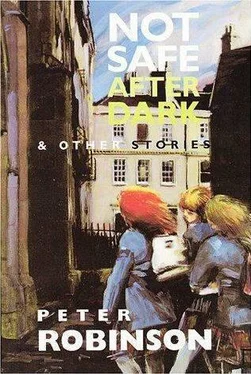He turned and pointed down the street. ‘Frank, please!’ he said. ‘You’ve got to come with me.’
I could hear the fear in his voice, so I followed him as quickly as I could to Maggie’s house. It was a fine October morning, with a hint of autumn’s nip in the air. He had left the door ajar. Slowly, I pushed it open and went inside. My first impression was more surprise at how clean and tidy the place was than shock at the bloody figure on the carpet. In my defence, lest I sound callous, I had fought in the first war and, by some miracle, survived the mustard gas with only a few blisters and a nasty coughing fit every now and then. But I had seen men blown apart; I had been spattered with the brains of my friends; I had crawled through trenches and not known whether the soft, warm, gelatinous stuff I was putting my hands in was mud or the entrails of my comrades. More recently, I had also helped dig more than one mangled or dismembered body from the ruins, so a little blood, a little death, never bothered me much. Besides, despite the pool of dried blood around her head, Mad Maggie looked relatively peaceful. More peaceful than I had ever seen her in life.
Funny, but it reminded me of that old Dracula film I saw at the Crown, the one with Bela Lugosi. The count’s victims always became serene after they had wooden stakes plunged through their hearts. Mad Maggie hadn’t been a vampire, and she didn’t have a stake through her heart, but a bloodstained posser lay by her side, the concave copper head and wooden handle both covered in blood. A quick glance in the kitchen showed only one puzzling item: an unopened bottle of milk. As far as I knew, Harry’s last round had been the morning of the air raid, last Wednesday. I doubted that Maggie would have been able to get more than her rations; besides, the bottle top bore the unmistakable mark of the dairy where Harry worked.
Harry waited outside, unwilling to come in and face the scene again. Once I had taken in what had happened, I told him to fetch the police, the real police this time.
They came.
•
And they went.
One was a plainclothes officer, Detective Sergeant Longbottom, a dull-looking bruiser with a pronounced limp, who looked most annoyed at being called from his bed. He asked a few questions, sniffed around a bit, then got the ambulance men to take Maggie away on a stretcher.
One of the questions Sergeant Longbottom asked was the victim’s name. I told him that, apart from ‘Mad Maggie’, I had no idea. With a grunt, he rummaged around in the sideboard drawer and found her rent book. I was surprised to discover that she was called Rose Faversham, which I thought was actually quite a pretty name. Prettier than Mad Maggie, anyway. Sergeant Longbottom also asked if we’d had any strangers in the area. Apart from an army unit billeted near the park where they were carrying out training exercises, and the gypsy encampment in Silverhill Woods, we hadn’t.
‘Ah, gypsies,’ he said, and wrote something in his little black notebook. ‘Is anything missing?’
I told him I didn’t know, as I had no idea what might have been here in the first place. That seemed to confuse him. For all I knew, I went on, the rumour might have been right, and she could have had a mattress stuffed with banknotes. Sergeant Longbottom checked upstairs and came back scratching his head. ‘Everything looks normal,’ he said, then he poked around a bit more, noting the canteen of sterling silver cutlery, and guessed that Mad Maggie had probably interrupted the thief, who had killed her and fled the scene – probably back to the gypsy encampment. I was on the point of telling him that I thought the Nazis were supposed to be persecuting gypsies, not us, but I held my tongue. I knew it would do no good.
Of course, I told him how everyone in the neighbourhood knew Mad Maggie paid no attention to air raids, how she even seemed to enjoy them the way some people love thunderstorms, and how Tom Sellers, the ARP man, had remonstrated with her on many occasions, only to get a dismissive wave and the sight of her ramrod-stiff back walking away down the street. Maggie had also been fined more than once for blackout infringements, until she solved that one by keeping her heavy black curtains closed night and day.
I also told Longbottom that, in the blackout, anyone could have come and gone easily without being seen. I think that was what finally did it. He hummed and hawed, muttered ‘Gypsies’ again, made noises about a continuing investigation, then put his little black notebook away, said he had pressing duties to attend to and left.
•
And there things would have remained had I not become curious. No doubt Mad Maggie would have been fast forgotten and some poor, innocent gypsy would have been strung up from the gallows. But there was something about the serenity of Mad Maggie’s features in death that haunted me. She looked almost saintlike, as if she had sloughed off the skin of despair and madness that she had inhabited for so long and reverted to the loving, compassionate Christian woman she must have once been. She had a real name now, too: Rose Faversham . I was also provoked by Detective Sergeant Longbottom’s gruff manner and his obvious impatience with the whole matter. No doubt he had more important duties to get back to, such as the increased traffic in black market onion substitutes.
I would like to say that the police searched Maggie’s house thoroughly, locked it up fast and put a guard on the door, but they did nothing of the kind. They did lock the front door behind us, of course, but that was it. I imagined that, as soon as he found out, old Grasper, the landlord, would slither around, rubbing his hands and trying to rent the place out quickly again, for twice as much, before the army requisitioned it as a billet.
One thing I had neglected to tell Detective Sergeant Longbottom, I realized as I watched his car disappear around a pile of rubble at the street corner, was about Fingers Finnegan, our local black marketeer and petty thief. Human nature is boundlessly selfish and greedy, even in wartime, and air raids provided the perfect cover for burglary and black market deals. The only unofficial people on the streets during air raids were either mad, like Maggie, or up to no good, like Fingers. We’d had a spate of burglaries when most decent, law-abiding people were in St Mary’s church crypt, or at least in their damp and smelly backyard Anderson shelters, and Fingers was my chief suspect. He could be elusive when he wanted to be, though, and I hadn’t seen him in a number of days.
Not since last Wednesday’s air raid, in fact.
•
After the police had gone, Harry and I adjourned to my house, where, despite the early hour, I poured him a stiff brandy and offered him a Woodbine. I didn’t smoke, myself, because of that little bit of gas that had leaked through my mask at Ypres, but I had soon discovered that it was wise to keep cigarettes around when they were becoming scarce. Like all the rationed items, they became a kind of currency. I also put the kettle on, for I hadn’t had my morning tea yet, and I’m never at my best before my morning tea. Perhaps that may be one reason I have never married; most of the women I have met chatter far too much in the morning.
‘What a turn up,’ Harry said, after taking a swig and coughing. ‘Mad Maggie, murdered. Who’d imagine it?’
‘Her killer, I should think,’ I said.
‘Gypsies.’
I shook my head. ‘I doubt it. Oh, there’s no doubt they’re a shifty lot. I wouldn’t trust one of them as far as I could throw him. But killers? A defenceless woman like Maggie? I don’t think so. Besides, you saw her house. It hadn’t been touched.’
Читать дальше










![Джеймс Чейз - Not Safe to Be Free [= The Case of the Strangled Starlet]](/books/417649/dzhejms-chejz-not-safe-to-be-free-the-case-of-the-thumb.webp)

